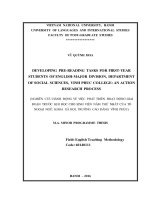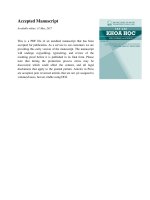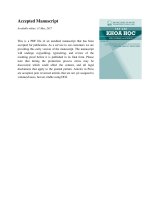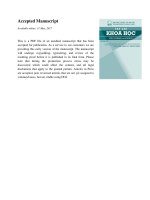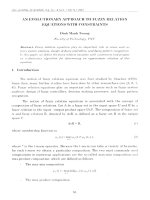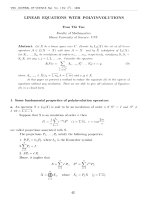DSpace at VNU: Sensing microgripper with pid control systems
Bạn đang xem bản rút gọn của tài liệu. Xem và tải ngay bản đầy đủ của tài liệu tại đây (338.72 KB, 5 trang )
Sensing microgripper with pid control systems
Phan Hữu Phú
Trường Đại học Công nghệ
Ngành: Kỹ thuật điện tử; Mã số: 60 52 70
Người hướng dẫn: TS. Chử Đức Trình
Năm bảo vệ: 2012
Abstract: Recently, MEMS and NANO are considered very importance technologies in
21th century that play a key role for the development of modern electronic devices. It was
only in the early 90s of previous century that significant work in the field of microelectro-mechanical systems (MEMS) began. At present, there is still a lack of tools for
manipulation of microstructures that are not directly accessible by the existing machines
or robots that handle macro objects. Therefore, the development of micro-tools for
handling and manipulating particles or small components (sized in the micrometer range)
with the applications envisioned in microassembly, microrobotics, single cell
manipulation and positioning, cell separation, minimally invasive and living cell surgery
continues to be a great technological challenge. The sensing microgripper is capable of
providing large jaw displacement and output sensing voltage is presented in [4]. This
device is able to monitor the jaw displacement and the resulting applied force. The device
is made on SOI silicon wafers with a fabrication process compatible with CMOS
technology. However, to commercialization this device, some additions research and
development need to be continued such as reducing the operation temperature for living
cell applications, improvement of accuracy in modeling, and its control system. This
thesis will be focused in designing, and simulation a control system for the sensing
microgripper based on a standard Bi-CMOS process. The target is built up a fully closeloop control manipulation system which is integrated on chip with the sensing
microgripper.
Keywords: Hệ thống vi cơ điện; Hệ thống điều khiển; Microgrippe cảm biến; Kỹ thuật
điện tử
Content
2
TABLE OF CONTENTS
DECLARATION......................................................................................................................1
ACKNOWLEDGEMENTS.....................................................................................................4
ABSTRACT..............................................................................................................................5
LIST OF ABBREVIATIONS .................................................................................................6
CHAPTER 1 INTRODUCTION ............................................................................................7
1.1 MANIPULATION IN MICRO-WORLD ................................................................................................................7
1.2 MICRO-GRIPER FOR MICRO-MANIPULATION ..................................................................................................7
1.2.1 Electrostatic microgripper ...................................................................................................................7
1.2.2 Piezoelectric microgripper...................................................................................................................8
1.2.3 Electrothermal microgripper................................................................................................................8
1.2.4 Polymeric electrothermal microgripper .............................................................................................10
1.3 MICRO-MANIPULATION WITH A FEEDBACK SYSTEM ....................................................................................11
1.3.1 Force sensor .......................................................................................................................................11
1.3.2 Sensing microgripper .........................................................................................................................14
CHAPTER 2 SENSING MICROGRIPPER .......................................................................17
2.1 INTRODUCTION ...........................................................................................................................................17
2.2 FORCE-SENSING CANTILEVER......................................................................................................................17
2.3 SILICON-POLYMER ELECTROTHERMAL MICROGRIPPER................................................................................18
2.4 SENSING MICROGRIPPER ..............................................................................................................................20
2.5 THE SENSING MICROGRIPPER CHARACTERISTICS .........................................................................................22
2.5.1 Electrothermal actuator characteristics.............................................................................................22
2.5.2 Sensing cantilever beam characteristics ............................................................................................25
2.5.3 Response frequency of the sensing microgripper ...............................................................................27
CHAPTER 3 BUILDING PID CONTROL FUNCTION ..................................................29
3.1 FEEDBACK LOOP CONTROL ..........................................................................................................................29
3.2 BUILDING A PID TRANSFER FUNCTION FOR THE SENSING MICROGRIPPER SYSTEM ......................................30
3.2.1 Transfer function of sensing microgripper .........................................................................................30
3.2.2 Transfer function of driver circuit ......................................................................................................30
3.2.3 Open-loop control ..............................................................................................................................31
3.2.4 Proportional control...........................................................................................................................32
3.2.5 Proportional – Integral control..........................................................................................................32
3.2.6 Proportional – Derivative control......................................................................................................33
3.2.7 Proportional – Derivative – Integral control .....................................................................................34
CHAPTER 4 ELECTRICAL DESIGN ...............................................................................35
4.1 INTRODUCTION ...........................................................................................................................................35
4.2 PROCESS SELECTION AND SIMULATION .......................................................................................................35
4.2.1 Process selection ................................................................................................................................35
4.2.2 Device modeling .................................................................................................................................36
4.2.3 Silicon-level simulation ......................................................................................................................36
4.2.4 Analog-only simulation ......................................................................................................................38
4.2.5 Mixed Analog/Digital simulation .......................................................................................................38
4.3 SYSTEM BLOCK DIAGRAM ...........................................................................................................................39
4.4 CELLS DESIGN .............................................................................................................................................40
4.4.1 Voltage reference generator...............................................................................................................40
4.4.2 Internal regulator ...............................................................................................................................45
4.4.2.1 The regulator:............................................................................................................................................... 45
4.4.2.2 The high temperature detector: .................................................................................................................... 46
4.4.2.3 The UVLO................................................................................................................................................... 47
4.4.2.4 Bias current generator.................................................................................................................................. 47
4.4.3 Digital to Analog converter (DAC) ....................................................................................................52
4.4.4 Buffer..................................................................................................................................................56
4.4.5 PID Controller ...................................................................................................................................56
4.4.6 Other cells ..........................................................................................................................................60
4.5 FULLY SCHEMATIC OF SYSTEM AND SIMULATION RESULTS .........................................................................62
3
4.5.1 Schematic ...........................................................................................................................................62
4.5.2 Simulation results ...............................................................................................................................62
CHAPTER 5 PHYSICAL DESIGN .....................................................................................65
5.1 INTRODUCTION OF LAYOUT ........................................................................................................................65
5.1.1 Matching concepts..............................................................................................................................65
5.1.2 MOS transistor layout ........................................................................................................................66
5.1.3 Resistor layout....................................................................................................................................68
5.1.4 Capacitor layout.................................................................................................................................69
5.1.5 Layout rules........................................................................................................................................70
5.2 SYSTEM FLOOR PLAN ..................................................................................................................................71
5.3 SYSTEM LAYOUT .........................................................................................................................................72
5.3.1 Sensing microgripper .........................................................................................................................72
5.3.2 Electrical circuits ...............................................................................................................................72
CHAPTER 6 CONCLUSION & FUTURE WORKS.........................................................74
6.1 CONCLUSION ...............................................................................................................................................74
6.2 FUTURE WORKS ...........................................................................................................................................74
6.2.1 Finishing the system layout ................................................................................................................74
6.2.2 Process establishment ........................................................................................................................74
6.2.3 Layout verification .............................................................................................................................75
6.2.4 Sample fabrication .............................................................................................................................75
6.2.5 Characterization.................................................................................................................................75
BIBLIOGRAPHY ..................................................................................................................76
76
Bibliography
[1]
Alan Hastings, “The art of Analog layout,” Prentice Hall, 1st ed., 2000.
[2]
Bang S. Lee, “Understanding the stable range of equivalent series resistace of an LDO
regulator”.
[3]
C.J. Kim, A.P. Pissano, and R.S. Muller, “Silicon-processed overhanging
microgripper,” J. Microelectromech. Syst., vol. 1, no. 1, 1992.
[4]
Chu Duc Trinh, “Sensing Microgripper for Micropartical handling”, Ph.D. Thesis
Delf University of Technology, 2008.
[5]
D.H. Kim, M.G. Lee, B. Kim, and Y. Sun, “A superrelastic alloy microgripper with
embedded electromagnetic actuators and piezoelectric force sensors a numerical and
experimenantal study,” Smart Mater. Struct., vol. 14, pp. 1265-1272, 2005.
[6]
Dan Clein, “CMOS IC layout: Concepts, Methodologies, and Tools,” Butterworth–
Heinemann, pp. 23-67, 2000.
[7]
F. Beyeler, A. Neild, S. Oberti, D. J. Bell, Y. Sun, J. Dual, and B.J. Nelson,
“Monolithically fabriacted microgripper with integrated force sensor for manipulating
microobjects and biological cells aligned in an ultrasonic field,” J. Microelectromech.
Syst., vol. 16, no. 1, pp. 7-15, 2007.
[8]
G. Greitmann and R.A. Busser, “Tactile microgripper for automated handling of
microparts,” Sensors and actuators A, vol. 53, pp. 410-415, 1996.
[9]
H. Guckel, J. Klein, T. Christenson, K. Skrobis, M. Laudon, and E.G. Lovell,
“Thermo-magnetic metal fluxure actuators,” Technical Digest, Solid-state sensors and
actuators workshop (Hilton Head, SC, USA), pp. 73-75, 1992.
[10]
John O. Attia, “Electronics and Circuit analysis using Matlab”, CRC Press LLC,
1999.
[11]
K. Molhave and O. Hansen, “Electro-thermally actuated microgrippers with
integrated force-feedback,” J. icromech. Microeng., vol. 15, pp. 1256-1270, 2005.
[12]
K. Tuck, “Using Microgrippers with the S100,” Zyvex application note 9703, 2006.
[13]
Luc Ouellet, “Low-temperature MEMS processing for intelligent MEMS over
CMOS,” Symposium on Microelectronics Research & Development in Canada, 2003.
[14]
M. Tortonese, R.C. Barrett, and C.F. Quate, “Atomic resolution with an atomic force
microscope using piezoresistive detection,” Appl. Phys. Lett., vol. 62, no. 8, pp. 834836, 1993.
[15]
M.C. Carrozza, P. Dario, and L. P. S. Jay, “Micromechanics in surgery,” Transactions
of the Institute of Measurement and Control, vol. 25, no. 4, pp. 309-327, 2003.
[16]
M.S.C. Lu, C.E. Huan, Z.H. Wu, C.F. Chen, S.Y. Huang, S.J. Hung, M.H. Cheng, and
Y.C. King, “A CMOS micromachined grippers array with on-chip optical detection,”
J. Micromech. Microeng., vol. 14, pp. 482-488, 2007.
77
[17]
Menciassi, A. Eisinberg, M.C. Carrozza, and P. Dario, “Force sensing
microinstrument for measuring tissue properties and pulse in microsurgery,”
IEEE/ASME Trans. Mechatronics, vol. 8, no. 1, 2003.
[18]
N. Chronis and L.P. Lee, “Electrothermally activated SU-8 microgripper for single
cell manipulation in solution,” J. Microelectromech. Syst., vol. 14, no. 4, pp. 857-863,
2005.
[19]
P.E. Allen, “CMOS analog circuit design, ” 2003.
[20]
P.R. Gray and R.J. Meyer, “Analysis and Design of Analog Integrated Circuits,”
NewYork: John Wiley & Sons, 2nd ed.,Chapter 4, 1984.
[21]
R. Salim, H. Wurmus, A. Harnisch, and D. Hulsenberg, “Microgrippers created in
microstructure glass,” Microsystem Technologies, vol. 4, pp. 32-34, 1997.
[22]
R.S. Fearing, “Survey of sticking effects for micro parts handling,” Proc. IEEE/RSJ
Int. Conf. Intell. Robot. Syst., Pittsburgh, PA, vol. 2, pp. 212-217, 1995.
[23]
S. Yang and T. Saif, “Mechanical response of single living cells by bio-MEMS
sensors,” Proc. 17th IEEE Conf. MEMS, 2004, pp. 265-267.
[24]
W. Chui, T.W. Kenny, H.J. Mamin, B.D. Terris, and D. Rugar, “Independent
detection of vertical and lateral forces with a sidewallimplanted dual-axis
piezoresistive cantilever,” Appl. Phys. Lett., vol. 72, no. 11, pp. 1388-1390, 1998.
[25]
Website
“Circuit
/>
[26]
Website:
“Control
tutorials
for
Matlab”
at
The University of Michigan.
[27]
Y. Sheng, N. Xi, U.C. Wejinya, and W.J.Li, “High sensitivity 2-D force sensor for
assembly of surface MEMS devices,” Proc. IEEE/RSJ Conf. Intell. Robot. Syst.,
Sedai, Japan, 2004, pp. 3363-3368.
[28]
Y. Sun, B.J. Nelson, D.P. Potasek, and E. Enikov, “A bulk microfabricated multiaxis
capacitive cellular force sensor using transverse comb drives,” J. Micromech.
Microeng., vol. 12, no. 6, pp. 832-840, 2002.
[29]
Z. Lu, P.C.Y. Chen, and W. Lin, “Force sensing and control in micromanipulation,”
IEEE Trans. On Systems, Man, and Cybernetics - Part C, vol. 36, no. 6, pp. 713-724,
2006.
sage:

